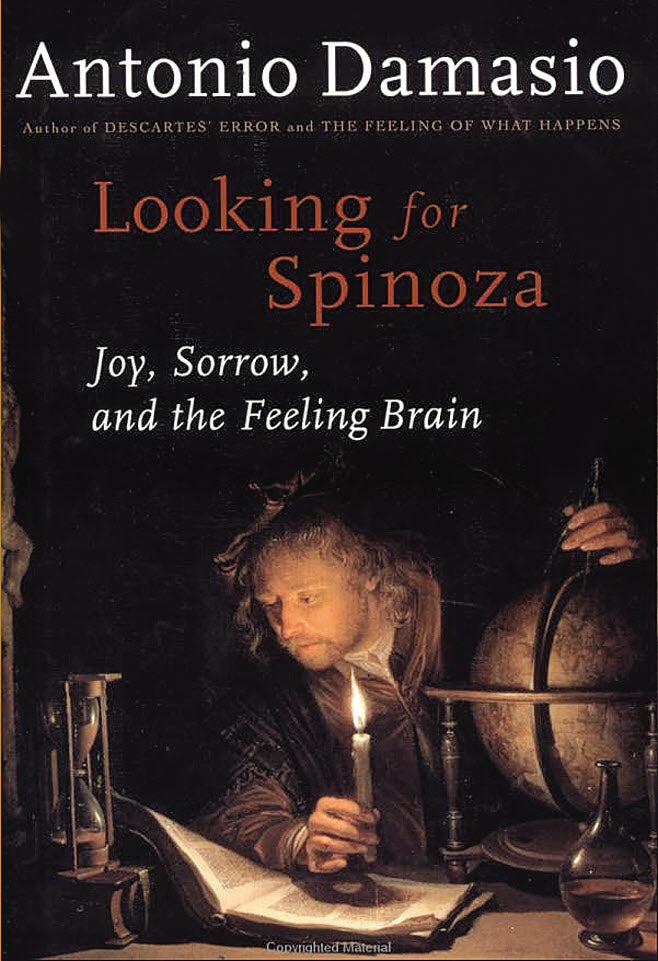Book Review: God on the Brain

Antonio Damasio’s book on the neurobiology of feelings and the pursuit of happiness is a little out of my area. I can’t comment on the discussion about the brain-stem switch, or the emotional impact of Parkinson’s Disease. I look forward to comments from qualified Christina neuroscientists. But I found these discussions fascinating, even to the lay reader, and on that point alone the book is a valuable read.
However, this book, the third from Damasio on the relationship between the brain, feelings, emotions and the meaning of life, enters my sphere of interest because of the way the author pushes discussion towards spiritual questions—towards the examination of the place of a human being in the universe, the way to live ‘the good life’, and whether or not there is a personal God to whom the universe owes account.
Looking for Spinoza reveals its point of reference in its title. In adolescence, Damasio was intrigued by Spinoza—the 17th century pantheist philosopher whose understanding of the body/mind connection (“the human mind is the idea of the human body”) foreshadowed today’s neuroscience—and has returned to him now, as a celebrated senior neurologist, in order to make some sense of both his scientific discoveries and his personal convictions.
Spinoza identified God with Nature as the cause and essence of all that is. This is not far from the position of Einstein, or perhaps Paul Davies today. God is not personal, but God is Law or Nature or the means by which the universe exists. Spinoza’s God, says Damasio, is therefore also found within the mind, since it is of the same substance as the body.
Throughout Looking for Spinoza, Damasio interweaves discussion of the biology and philosophy of neuroscience with a personal exploration of Spinoza’s life and ideas. It’s an attractive kind of literature—an intellectual mini-biography—because it allows the reader to understand the subject through the lens of what it is they are known for, rather than the usually mind-numbing minutiae of their everyday life. In Spinoza’s case, his understanding of mind and body as the same thing develops into a strong advocacy for democratic states and a humanistic ethics based on rational understanding. Damasio traces some of Spinoza’s influence in the history and politics of 17th Century Holland, as well as on today’s attempts at global social governance in bodies such as the World Health Organisation.
There is much that is attractive in the view that mind, consciousness and emotions all arise in different ways from the body itself rather than from an extra-bodily entity such as a soul or spirit. Such a view is eminently testable through science; it makes substantial sense of mental illness, erratic behaviour, drug effects and even spiritual experiences. However, there is an enormous leap from such a position to the view that God and Nature are one. Damasio (unlike Spinoza) seems unwilling to make the leap; he is uncomfortable with the hypothesis that there is a ‘God gene’ (p.284), and with Spinoza’s ascetic and individualistic response to God’s impersonality. Damasio still favours intimate relationships and richness of friendship over individual striving for happiness and inner control. And he recognizes that there seems to be something religious to these social impulses.
It strikes me that Damasio may be lagging behind the Christian scientific community when it comes to philosophy of science. For some decades now, Christian scientists and philosophers have been working on questions related to body and spirit. (See Case #3 and the Topics section of the CASE website for material on this.) For instance, there has been considerable thinking on the nature and scientific possibility of resurrected bodies and its implications for an eternal mind (see Resurrection: theological and scientific assessments edited by Ted Peters). There is also an ongoing debate about whether human beings are ‘non-reducibly physical’ or whether there is a dualism of body and soul, with Christian believers on both sides of the debate.
But the point at which I differ strongly with Damasio’s vision is his optimism about human behaviour. His quest is for the life of joyous contentment: “We should seek joy, by reasoned decree, regardless of how foolish and unrealistic the quest may look. If we do not exist under oppression or in famine and yet cannot convince ourselves how lucky we are to be alive, perhaps we are not trying hard enough” (p.271). Damasio would have us pursue genuine happiness, through ethical behaviour, which will enable contentment. He writes: “Spinoza’s salvation—salus—is about repeated occasions of a kind of happiness that cumulatively make for a healthy mental condition” (p.273).
Spinoza’s vision of the ‘good life’ and ‘the path to salvation’ requires an individual whose mind can control their emotions and subsequent feelings and actions to a degree found only in a few. How many of us can reason our way into states of happiness, especially if we are the reflective types who look at the world, our neighbours and ourselves and feel that something really is wrong?
Damasio is aware of the problem: Spinoza does not offer a solution to the “suffering and inequity that biology and society regularly visit upon humans, let alone compensation for the losses incurred along the way” (p.278). Damasio is aware that Spinoza is offering, in his Nature-God, an inadequate response to human existential yearning, to our sense of puropose, to the structures of our conscious minds and to our experience of the world. And yet, Damasio suspects, that this may be all we have—“a noble illusion meant to let us face the music and dance” (p.279).
Again, I wonder, how many of us can in fact accept this and behave in the life-affirming way that Spinoza and Damasio recommend, like Eric Idle’s character in Monty Python’s Life of Brian, singing while being crucified, “Always look on the bright side of death”? There is, no doubt, some psychological purchase in this kind of optimism. Repeated experiments demonstrate how much more functional, and how much happier, people are when they interpret the cup as half-full rather than half-empty. But the half-full perspective may not be available to acquire. How many of us can ‘learn’ optimism, as Martin Seligman urged? How many need more than such psychological therapies in order to satisfy their spiritual longings as life drags on?
Damasio defines the spiritual as that which gives us this sense of serene joy, harmony, nourishment and peace. He is optimistic (of course!) that neurobiological research will help human beings to gain the spiritual, by discovering which genes are responsible for making us feel the way we do, and discovering drugs which help to ‘correct’ unhappy (unspiritual) feelings and therefore provide for us a better way of coping with the meaningless, indifferent universe. By the end of the book, it started to sound very much like Brave New World. Speaking of the impact of the drug, soma, World Controller Mustapha Mond says:
There's always soma to calm your anger, to reconcile you to your enemies, to make you patient and long-suffering. In the past you could only accomplish these things by making a great effort and after years of hard moral training. Now, you swallow two or three half-gramme tablets, and there you are. Anybody can be virtuous now. You can carry at least half your morality about in a bottle. Christianity without tears-that's what soma is.
By the end of Looking for Spinoza, Damasio has come the conclusion that this kind of neuro-illusionary approach to life’s complexities is the best we can do. It will give us what Christians have—hope, love, peace, a moral framework—without the dogma. It will bring satisfaction.
But here’s my alternative: what about just keeping Christianity? When was it supposedly delivered the death blow? I’ve read a lot of arguments against Christianity, a lot of explorations of its problems and awkwardnesses, and a lot of alternative views on who Jesus was and what he did. But no one has made it impossible; no-one has falsified it where it can be falsified; no-one has made it unthinkable or unbelievable. On the contrary, support comes from many quarters, even neuroscience. Has Damasio given the personal God hypothesis enough time and attention? Might it not hold more answers than he has been led by Spinoza and his own research to believe?

Leave a comment
Comments will be approved before showing up.



